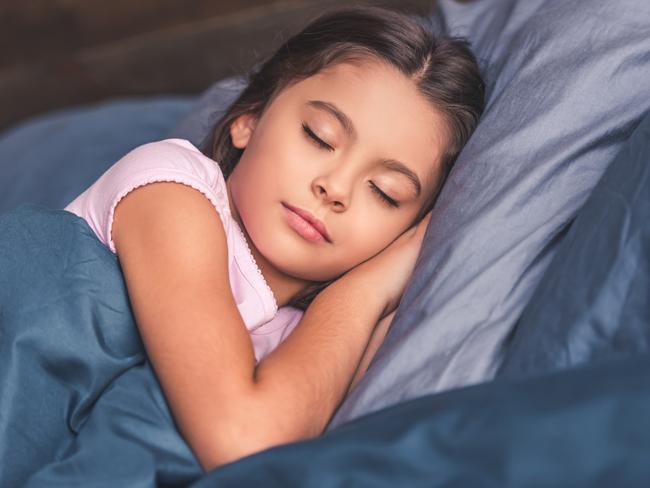Royal Children’s Hospital busts common sleep myths for kids
Almost half of parents believe this one thing is helping their children wind down before bed - but kids were instead twice as likely to have trouble falling asleep.
Sleep
Don't miss out on the headlines from Sleep. Followed categories will be added to My News.
Children are unknowingly having caffeine post-lunch, a top children’s hospital has warned, while almost half of parents believe screens help “wind down” kids before bed.
A new survey of more than 1600 Australian parents has exposed the myths and habits likely making bedtime harder and revealed one in four school-aged kids struggle to fall asleep.
The Royal Children Hospital’s national child health poll also found a third of parents believe teenagers are lazy if they cannot get up for school, and almost half think “too much” sleep is bad for them.
One in five primary school students – and a third of teenagers – consume caffeine after lunch, while 19 per cent of kids, across all ages, do not have a regular bed time.
More than 40 per cent of kids aged 5 to 17-years-old have a “problem” with their sleeping pattern, while 28 per cent of school-aged kids “usually or always” use screens in bed in the hour before sleep.

Paediatrician and poll director Dr Anthea Rhodes said these habits and beliefs were based on myths and highlighted that teenagers, for example, were not lazy.
“Many people aren’t aware that the natural body clock changes with the onset of puberty, meaning that teens are actually physiologically wired to want to stay up late and sleep in,” she said.
“In some parts of the world, they’ve even changed the timing of the school day to adjust to what is normal in the body clock for teens.”
She said the idea that “too much sleep” was bad wasn’t true either and, if your child seems to constantly be tired and need to sleep, it may be a sign.
“Either they’re not getting enough sleep, or the sleep they are getting is not good enough quality to mean that they’re rested,” she said.
“Where young people might be having trouble with their mental health, sleep problems is one of the way that it can show up.”
The poll found children who had caffeine after lunch, or used screens before bed, were about twice as likely to also have trouble falling asleep.
Dr Rhode said these statistics did not mean children were drinking coffee, but reflected how parents were often unaware — until given a list in their survey — that caffeine was in food and drinks like matcha or chai tea.
“Most people don’t understand that a 200 gram block of chocolate is equivalent to a standard cup of instant coffee in terms of the caffeine content,” she said.
She said some parents were also misinformed about the impact of screens.
“They might be lying there looking quite almost sleepy on their iPad,” she said.
“But what is happening in their brain is that light simulation is actually suppressing their melatonin and stopping that natural message that says, ‘time for sleep, time for rest’,” she said.
RCH Respiratory and sleep paediatrician Dr Moya Vandeleur said children aged five to 12 typically required 10 to 12 hours, while 13 to 17-years olds needed nine to 11 hours.
“Setting a regular bedtime, having a dark and quiet sleeping space and building independent sleep, when a child can fall asleep on their own, are all part of practising good sleep hygiene,” she said.
“A healthy night’s sleep is key to a child’s overall health and wellbeing.”
Originally published as Royal Children’s Hospital busts common sleep myths for kids


